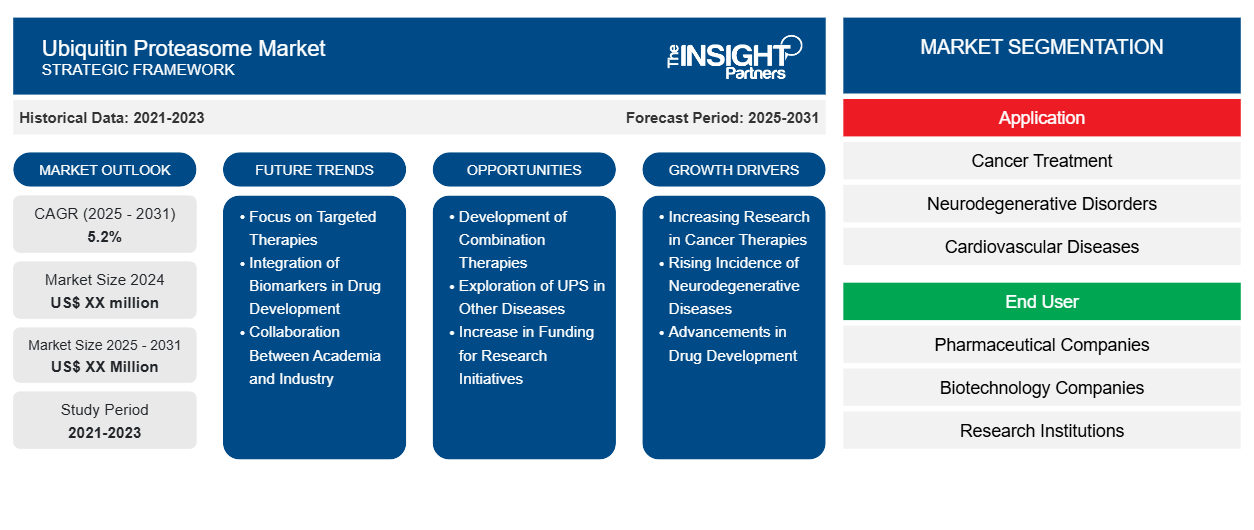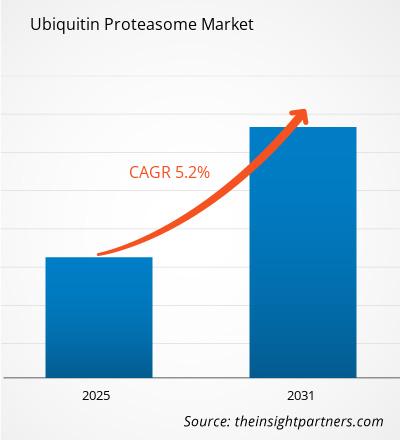The Ubiquitin Proteasome Market is expected to register a CAGR of 5.2% from 2025 to 2031, with a market size expanding from US$ XX million in 2024 to US$ XX Million by 2031.
The report is segmented by Application (Cancer Treatment, Neurodegenerative Disorders, Cardiovascular Diseases, Autoimmune Diseases), By End User (Pharmaceutical Companies, Biotechnology Companies, Research Institutions, Contract Research Organizations), By Product Type (Proteasome Inhibitors, Ubiquitin Pathway Modulators, Assay Kits, Reagents), By Form (Liquid, Powder, Tablet). The global analysis is further broken-down at regional level and major countries. The Report Offers the Value in USD for the above analysis and segments.
Purpose of the Report
The report Ubiquitin Proteasome Market by The Insight Partners aims to describe the present landscape and future growth, top driving factors, challenges, and opportunities. This will provide insights to various business stakeholders, such as:
- Technology Providers/Manufacturers: To understand the evolving market dynamics and know the potential growth opportunities, enabling them to make informed strategic decisions.
- Investors: To conduct a comprehensive trend analysis regarding the market growth rate, market financial projections, and opportunities that exist across the value chain.
- Regulatory bodies: To regulate policies and police activities in the market with the aim of minimizing abuse, preserving investor trust and confidence, and upholding the integrity and stability of the market.
Ubiquitin Proteasome Market Segmentation
Application
- Cancer Treatment
- Neurodegenerative Disorders
- Cardiovascular Diseases
- Autoimmune Diseases
End User
- Pharmaceutical Companies
- Biotechnology Companies
- Research Institutions
- Contract Research Organizations
Product Type
- Proteasome Inhibitors
- Ubiquitin Pathway Modulators
- Assay Kits
- Reagents
Form
- Liquid
- Powder
- Tablet
Customize This Report To Suit Your Requirement
Get FREE CUSTOMIZATIONUbiquitin Proteasome Market: Strategic Insights

-
Get Top Key Market Trends of this report.This FREE sample will include data analysis, ranging from market trends to estimates and forecasts.
Ubiquitin Proteasome Market Growth Drivers
- Increasing Research in Cancer Therapies: The growing emphasis on developing effective cancer therapies is a significant driver for the ubiquitin-proteasome market. Researchers are exploring the role of the ubiquitin-proteasome system (UPS) in regulating protein degradation, which is crucial for cancer cell survival. This has led to the development of proteasome inhibitors, spurring market growth and innovation in targeted therapies.
- Rising Incidence of Neurodegenerative Diseases: The increasing prevalence of neurodegenerative diseases, such as Alzheimer's and Parkinson's, is driving demand for ubiquitin-proteasome system research. The UPS is involved in protein homeostasis, and its dysfunction is linked to these diseases. Consequently, there is a growing need for therapeutic agents that can enhance proteasome activity, thus fostering market expansion.
- Advancements in Drug Development: Recent advancements in drug development techniques, including high-throughput screening and molecular profiling, are propelling the ubiquitin-proteasome market forward. These innovations enable researchers to identify and develop new drugs targeting the UPS more efficiently. As a result, the market is witnessing an influx of novel therapeutics aimed at various diseases, including cancer and neurodegenerative disorders.
Ubiquitin Proteasome Market Future Trends
- Focus on Targeted Therapies: There is a notable trend towards the development of targeted therapies that utilize the ubiquitin-proteasome system. These therapies aim to selectively degrade disease-causing proteins, offering a novel approach to treatment. As precision medicine gains traction, the demand for such targeted interventions is expected to grow, influencing market dynamics.
- Integration of Biomarkers in Drug Development: The integration of biomarkers in drug development related to the ubiquitin-proteasome system is becoming increasingly important. Biomarkers can help identify patient populations most likely to benefit from proteasome inhibitors and other therapies. This trend enhances the efficiency of clinical trials and facilitates the development of personalized treatment strategies, positively affecting the market.
- Collaboration Between Academia and Industry: There is a growing trend of collaboration between academic institutions and biotech/pharmaceutical companies in the ubiquitin-proteasome space. These partnerships are essential for advancing research, sharing resources, and accelerating the discovery of novel therapeutics. Such collaborations are expected to drive innovation and propel market growth in the coming years.
Ubiquitin Proteasome Market Opportunities
- Development of Combination Therapies: There is a significant opportunity for the development of combination therapies that incorporate proteasome inhibitors with other treatment modalities, such as immunotherapy or targeted agents. This approach could enhance treatment efficacy and broaden the therapeutic applications of ubiquitin-proteasome system-targeted drugs, creating potential market expansion.
- Exploration of UPS in Other Diseases: Exploring the role of the ubiquitin-proteasome system in diseases beyond cancer and neurodegeneration presents a lucrative opportunity. Conditions like autoimmune diseases, cardiovascular diseases, and metabolic disorders may also benefit from therapeutics targeting the UPS. This untapped potential can lead to new product development and diversification within the market.
- Increase in Funding for Research Initiatives: The increase in funding for research initiatives focused on the ubiquitin-proteasome system is creating opportunities for market growth. Government grants, private investments, and philanthropic contributions are directed towards understanding the UPS's role in health and disease. This financial support can expedite research and development efforts, leading to new therapeutic options.
Ubiquitin Proteasome Market Report Scope
| Report Attribute | Details |
|---|---|
| Market size in 2024 | US$ XX million |
| Market Size by 2031 | US$ XX Million |
| Global CAGR (2025 - 2031) | 5.2% |
| Historical Data | 2021-2023 |
| Forecast period | 2025-2031 |
| Segments Covered |
By Application
|
| Regions and Countries Covered |
North America
|
| Market leaders and key company profiles |
|
Ubiquitin Proteasome Market Players Density: Understanding Its Impact on Business Dynamics
The Ubiquitin Proteasome Market is growing rapidly, driven by increasing end-user demand due to factors such as evolving consumer preferences, technological advancements, and greater awareness of the product's benefits. As demand rises, businesses are expanding their offerings, innovating to meet consumer needs, and capitalizing on emerging trends, which further fuels market growth.

Key Selling Points
- Comprehensive Coverage: The report comprehensively covers the analysis of products, services, types, and end users of the Ubiquitin Proteasome Market, providing a holistic landscape.
- Expert Analysis: The report is compiled based on the in-depth understanding of industry experts and analysts.
- Up-to-date Information: The report assures business relevance due to its coverage of recent information and data trends.
- Customization Options: This report can be customized to cater to specific client requirements and suit the business strategies aptly.
The research report on the Ubiquitin Proteasome Market can, therefore, help spearhead the trail of decoding and understanding the industry scenario and growth prospects. Although there can be a few valid concerns, the overall benefits of this report tend to outweigh the disadvantages.
Frequently Asked Questions
- Historical Analysis (2 Years), Base Year, Forecast (7 Years) with CAGR
- PEST and SWOT Analysis
- Market Size Value / Volume - Global, Regional, Country
- Industry and Competitive Landscape
- Excel Dataset
Recent Reports
Testimonials
Reason to Buy
- Informed Decision-Making
- Understanding Market Dynamics
- Competitive Analysis
- Identifying Emerging Markets
- Customer Insights
- Market Forecasts
- Risk Mitigation
- Boosting Operational Efficiency
- Strategic Planning
- Investment Justification
- Tracking Industry Innovations
- Aligning with Regulatory Trends







 Get Free Sample For
Get Free Sample For